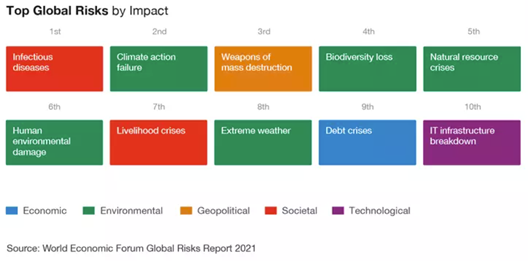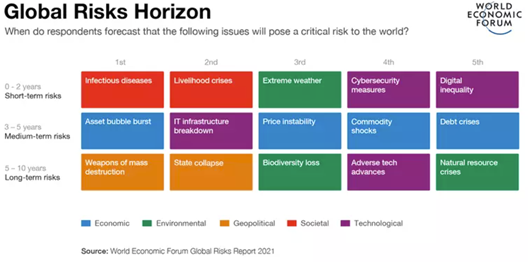
As it does every year, the World Economic Forum identifies and analyzes a long list of threats and hazards - 35 to be exact - in its latest Global Risks Report. One of them stands apart from all the others, for reasons both obvious and cautionary.
“The immediate human and economic cost of COVID-19 is severe,” begins the executive summary of the 2021 report, the 16th annual, which was published January 19. “It threatens to scale back years of progress on reducing poverty and inequality and to further weaken social cohesion and global cooperation.”
With the pandemic looming so large, infectious diseases ranks No. 1 in impact in the Global Risks Perception Survey, which is at the heart of the WEF report. It is also first among “clear and present dangers,” a newly defined category in a ranking of risks over short-, medium- and long-term time horizons ranging from zero to 10 years.
However, when more than 600 members of the WEF community were asked to rate the effectiveness of the global response to the coronavirus pandemic, on a scale of 1 (complete failure) to 5 (complete success), participants in South Asia gave the highest average grade, 2.72. All others came in at 2.51 (the North America reading) or lower.
And although the Switzerland-based forum's risk reports have been flagging infectious diseases since 2006 - placing it No. 2 in impact in 2015, in the wake of H1N1 and Ebola - it did not make the top 10 in January 2020. In terms of likelihood over 10 years, infectious diseases was 10th last year and is currently fourth, behind extreme weather, climate action failure, and human environmental damage.


The 2021 report therefore critiques shortcomings in “global cooperation, information sharing and coordination” against the virus - singling out the World Health Organization and United Nations Security Council, among other entities - as well as risk management shortsightedness. The WEF not only delineates perceived risks out to 10 years, but adds a postscript from a new Global Future Council on Frontier Risks listing “potential shocks that are less well known but would have huge impacts if manifested,” including accidental war, collapse of an established democracy, and a permafrost melt releasing ancient micro-organisms.
Another new contributor to the 2021 analysis is a Chief Risk Officers Community, with Accenture, Bain & Co., Barclays, Infosys, Mastercard, McKinsey & Co., PayPal and UBS among the organizations represented.
Importance of Anticipation
“Despite some remarkable examples of determination, cooperation and innovation, most countries struggled with at least some aspects of crisis management - and the world has not yet come together to mitigate the fallout,” says a section of the Global Risks Report devoted to COVID-19 “hindsight.” “If the lessons drawn from this crisis inform decision-makers only how to better prepare for the next pandemic - rather than enhancing the processes, capabilities, and culture for galvanizing effort around other major concerns - the world will have fallen into the familiar risk management trap of planning for the last crisis rather than anticipating the next.”
“We know how difficult it is for governments, business and other stakeholders to address such long-term risks, but the lesson here is for all of us to recognize that ignoring them doesn't make them less likely to happen,” says WEF managing director Saadia Zahidi in a press release.
Suggesting possible positive outcomes from the lessons learned, Zahidi and WEF founder and executive chairman Klaus Schwab write in the report's preface that “strengthening strategic foresight is now more important than ever. With the world more attuned to risk, there is an opportunity to leverage attention and find more effective ways to identify and communicate risk to decision-makers.”
The report and “lessons learned from the pandemic crisis” serve as “a reminder that companies should remain vigilant about 'forgotten risks' that may seem low in probability but are potentially catastrophic in their impacts and their interactions with other perennial risks,” says an article in Marsh & McLennan's Brink Insights written by Carolina Klint, risk management leader for Continental Europe, Marsh. (Marsh & McLennan Companies, Zurich Insurance Group and South Korea's SK Group are Global Risks Report strategic partners, alongside academic partners National University of Singapore, the Oxford Martin School at the University of Oxford, and Wharton Risk Management and Decision Processes Center, University of Pennsylvania.)
Pandemic-Related Consequences
“Our analysis centers on the risks and consequences of widening inequalities and societal fragmentation,” Schwab and Zahidi state in their preface. “In some cases, disparities in health outcomes, technology, or workforce opportunities are the direct result of the dynamics the pandemic created. In others, already present societal divisions have widened, straining weak safety nets and economic structures beyond capacity.
“Whether the gaps can be narrowed,” they continue, “will depend on the actions taken in the wake of COVID-19 to rebuild with a view towards an inclusive and accessible future. Inaction on economic inequalities and societal divisiveness may further stall action on climate change - still an existential threat to humanity.”
The WEF customarily stresses interconnections among the panoply of risks - 12 were added this year, including digital inequality and collapse of a systemically important industry - and now is underscoring the need to take them all seriously.
“COVID-19 has demonstrated the rapid and cascading impacts of a global catastrophic risk manifested,” it says in introducing the frontier risk discussion. “Pandemics - as well as climate change, debt crises, cyberattacks and others - are high-likelihood, high-impact risks on which we focus our attention each year in the Global Risks Report.” The frontier objective is “to encourage more expansive thinking about the universe of risk possibilities in the next decade” and “to better enable preparation, rather than paralysis, as well as resilience in the face of crisis.”
Natural, Economic and Technological Hazards
A majority of survey respondents rated infectious diseases, livelihood crises and extreme weather events as the top “clear and present dangers” over the next two years.
The leading “knock-on effects,” or three- to five-year medium-term risks, include asset bubble bursts, IT infrastructure breakdown and the economic hazards of price instability, commodity shocks and debt crises.

The long-term “existential threats” over five to 10 years are led by weapons of mass destruction, state collapse, biodiversity loss and adverse outcomes of tech advances. The last encompasses “intended or unintended negative consequences of technological advances on individuals, businesses, ecosystems and/or economies: AI, brain-computer interfaces, biotechnology, geo-engineering, quantum computing etc.”
At the same time, a 28-country World Economic Forum/Ipsos survey indicates favorable consumer attitudes toward technology, with nine out of 10 respondents expecting the availability of digital tools and technology to improve or stay the same in 2021. “However, there are global concerns with deteriorating health, loss of income or employment, and more frequent weather-related natural disasters - each perceived as a real threat by three out of five adults across the world,” the forum said when releasing those results on January 22.
“Trilemma” for Businesses
The Global Risks Report warns of an emerging “disruptive trilemma” of challenges to doing business: “national agendas, technology that is running riot, and heightened public scrutiny.”
“The pandemic has strengthened the mandate of states to safeguard national economic well-being,” WEF explains, and “amplified protectionist trends” could increase costs and uncertainties in the business environment. “How governments manage the challenge of stemming the losses arising from COVID-19 while prioritizing future-oriented stimulus packages will shape the risks that individual companies face.”
Still to be determined is “whether governments and society will tolerate the growing dominance” of a small number of big technology players that have become “able to ward off legal challenges and expand their influence across industries and government agendas.” The WEF notes that in the Global Risks Perception Survey, tech governance failure is a top 10 medium-term risk.
Partnerships and “Risk Champions”
On a more positive note, the report says, “New partnerships can be forged . . . Big tech can work with governments to strengthen resilience, enhance efficiencies and deliver new targeted services such as accessible finance products for disadvantaged groups. Technology-based services can help to create new business ecosystems and level up opportunities, closing digital divides. Large companies can help smaller ones in their value chain to set sustainability objectives, formulate standards and measure progress.”
The report outlines “four governance opportunities to strengthen the overall resilience of countries, businesses and the international community: (1) formulating analytical frameworks that take a holistic and systems-based view of risk impacts; (2) investing in high-profile 'risk champions' to encourage national leadership and international cooperation; (3) improving risk communications and combating misinformation; and (4) exploring new forms of public-private partnership on risk preparedness.”
Risk champions on a national level “can bring together different stakeholders to spur innovation in risk analysis, financing and response capabilities, and improve relationships between scientific experts and political leaders,” WEF says. They “should be positioned before the frenzy of the next crisis - whatever it proves to be - yet, even with risk champions in place, the importance of leadership attention to risk at the highest levels in business and government is by no means lessened.”
Katherine Heires is a freelance business journalist and founder of MediaKat llc.